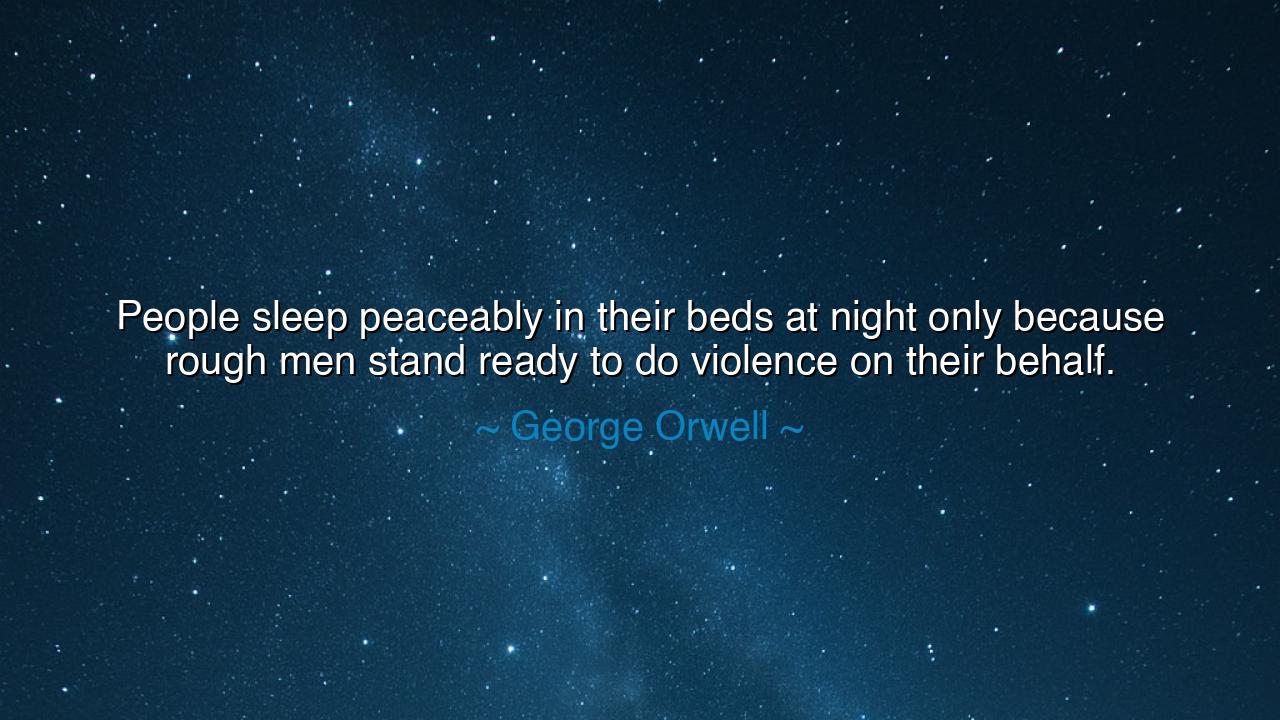
People sleep peaceably in their beds at night only because rough
People sleep peaceably in their beds at night only because rough men stand ready to do violence on their behalf.






George Orwell once wrote with unflinching clarity: “People sleep peaceably in their beds at night only because rough men stand ready to do violence on their behalf.” These words, though often quoted and sometimes misattributed, distill a truth that echoes through all ages—the paradox that peace is often guarded by those willing to confront the darkness. In Orwell’s world, born from the fires of war and tyranny, he saw that comfort and safety are not gifts freely given, but blessings maintained by sacrifice. His words remind us that the serenity of civilization rests upon the shoulders of those who face what others cannot bear to see.
In the ancient style of wisdom, this truth finds harmony with the lessons of history. Every temple of peace was built upon the vigilance of sentinels. The philosopher may preach harmony, and the poet may sing of love, but neither can flourish without the protection of the warrior who stands in the storm. Orwell, a soldier and journalist, had seen the fragility of order with his own eyes. He fought in the Spanish Civil War and witnessed both courage and cruelty. It was there he learned that violence, when guided by conscience, can become a shield rather than a sword. His words were not praise of brutality, but reverence for those who bear the weight of necessary force so that others might live unburdened.
The ancients understood this balance well. The Roman legions, disciplined and enduring, were the pillars upon which peace—the Pax Romana—stood. They were not scholars or saints, but they held the frontiers so that others could trade, teach, and worship. Likewise, in every age, there have been such “rough men”—not perfect, not gentle, but steadfast. They are the guards on the wall, the sailors in stormy seas, the firefighters who walk into flame, the soldiers who move toward the sound of gunfire. Their courage is not celebrated enough, for true guardians rarely seek glory; they seek only to do their duty and return home alive.
And yet Orwell’s reflection carries sorrow as well as gratitude. For he knew that those who live by the sword, even righteously, bear scars unseen by those they protect. The rough men he speaks of are not merely strong—they are burdened. To be ready to do violence is to stand between chaos and innocence, and such a position demands both strength and conscience. The tragedy of their calling is that they often must lose part of their peace to preserve the peace of others. Thus, their service is a quiet tragedy wrapped in honor—a sacred duty that the world too often forgets.
Consider the story of Winston Churchill during the Second World War. While much of Britain slept in fear of the Blitz, Churchill’s command and the unyielding defense of British soldiers held the line against tyranny. The people slept, but the guardians of freedom did not. They endured sleepless nights and bloodied days so that others could dream again. This, in essence, is what Orwell’s quote means—to recognize that civilization survives not by accident, but because brave souls confront the terrors that threaten it.
But Orwell’s wisdom also carries a warning. If society forgets the cost of its peace, it grows weak and ungrateful. A generation that mocks its protectors or denies the necessity of strength invites the return of danger. The balance of peace is delicate—it demands both compassion and vigilance. Freedom is not sustained by comfort, but by courage. And courage often wears the face of those who are neither gentle nor refined, but whose hearts burn with duty.
So let this teaching be remembered: honor those who stand watch while others sleep. Whether they are soldiers in the field, police in the streets, or citizens who rise to defend what is right, they carry the burden of order that allows the rest of the world to dream. And for those who live in comfort, gratitude must be the answer to their sacrifice—not blind worship of power, but humble respect for its necessary place. As Orwell teaches, peace without guardians is an illusion; and the light of civilization, though fragile, shines because there are always a few willing to stand in its shadow and defend it.






AAdministratorAdministrator
Welcome, honored guests. Please leave a comment, we will respond soon